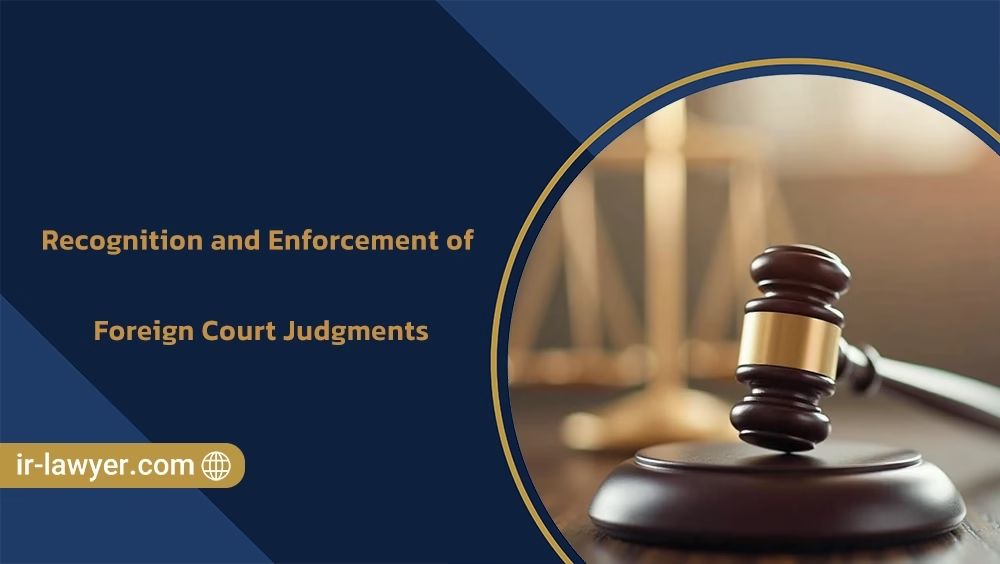
Lawyer Specializing in the Enforcement of Foreign Court Judgments
Author: Khalil Asayesh
Any reproduction of this text is legally prosecutable.
In my previous articles, I examined the crucial subject of enforcing foreign court judgments in Iran and the UAE. Additionally, I analyzed the global approach to enforcing foreign court judgments from both a structural perspective and the viewpoint of the judges responsible for execution. Khalil Asayesh, an international lawyer specializing in the enforcement of foreign court judgments, aims in this new article to explore the enforcement of foreign judgments from another dimension, particularly within the framework of private international law.
Globalization in recent decades has significantly reinforced the importance of recognizing and enforcing foreign court judgments. Individuals, companies, and assets now move more easily and rapidly across borders, making the enforcement of foreign judgments at times essential. On the other hand, despite globalization, countries remain concerned about protecting their legal sovereignty from foreign interference. The enforcement of foreign judgments in private international law refers to the process of recognizing and applying judgments issued by foreign courts in other jurisdictions. With the expansion of international trade relations and migration, the need to recognize and enforce foreign judgments—such as the enforcement of foreign court judgments in Iran—has become a critical issue in many countries. This process is particularly necessary when individuals or businesses reside or operate in different countries. Therefore, understanding the legal frameworks and broader considerations in this field is of great significance.
The diverse interests and traditions of various countries have led to a situation where, despite widespread acknowledgment of the necessity for an international multilateral convention on the enforcement of foreign judgments, it took nearly thirty years to reach an agreement within the Hague Convention on the Recognition and Enforcement of Foreign Judgments in Civil or Commercial Matters, dated July 2, 2019.

Recognition and Enforcement of Foreign Court Judgments
Khalil Asayesh, an international lawyer specializing in the enforcement of foreign judgments in Iran and abroad, emphasizes that recognition and enforcement is a relatively new field in private international law. Historically, many countries did not enforce foreign court judgments unless a treaty or intergovernmental agreement existed. In general, foreign court judgments are not automatically valid in other countries, and each jurisdiction has specific laws governing the recognition and enforcement of foreign judgments.
The enforcement of foreign court judgments typically occurs in two stages: the execution of judgments and the recognition of judgments. The execution of judgments, which primarily (though not exclusively) applies to judgments against individuals, allows a court order to be executed in the country of enforcement. Foreign judgment enforcement usually pertains to civil and commercial matters, meaning that foreign judgments in public law are generally not enforced. The second aspect of foreign judgment enforcement is recognition. Recognition essentially means that the judgment can be used as a res judicata and applies to both in personam (against individuals) and in rem (against property) judgments.
Theories of Recognition and Enforcement of Foreign Judgments in Private International Law
Two main theories explain why and when different countries should recognize foreign judgments: the International Comity Theory and the Vested Rights Theory.
According to Dutch jurist Ulrich Huber from the 17th century, recognizing foreign judgments is based on the principle of international comity, which can be denied when it harms the interests of the domestic court or its citizens. This theory argues that countries should recognize foreign judgments primarily for reasons related to international relations and out of respect for foreign sovereignty. Some interpretations of this theory suggest a narrower approach, emphasizing only the recognition of foreign sovereignty, while others argue that international comity includes broader considerations of diplomatic relations. Consequently, under this theory, countries are more likely to recognize foreign court judgments from politically, culturally, and commercially allied nations. This theory also suggests that mutual recognition of judgments between countries is a key motivating factor, such as the enforcement of UAE court judgments in Iran. However, the international comity approach may sometimes be problematic, as it could result in individuals being “punished” due to the actions or failures of foreign legal systems, thereby depriving them of their rights.
The second theory regarding the recognition of foreign judgments is the Vested Rights Theory (or Obligations Theory). This theory argues that foreign judgments should be recognized because they create obligations for one party toward another. It focuses on the specific circumstances under which the judgment was issued and whether the rights and obligations were properly and legally established. Therefore, the criteria for recognizing a foreign judgment emphasize the legal process and due process principles in the issuing country. If the rights of the parties were adequately protected during the legal proceedings, there would be a greater tendency to recognize the judgment. Unlike the international comity theory, this approach does not consider the political relations between two countries relevant.
Legal scholars have debated what factors courts should consider when assessing the fairness of a foreign legal system. U.S. federal judge Richard Posner, for instance, suggested that courts should only evaluate whether the issuing country has a “civilized” legal system. Others argue that instead of assessing the fairness of an entire legal system, courts should focus on whether due process was followed in the specific case at hand. In the English legal tradition, there is also debate on whether recognition should be based on formal procedural principles (such as jurisdiction and service of process) or a more flexible notion of justice, which some scholars argue was historically practiced in England during the 18th and 19th centuries.
Traditionally, civil law countries have leaned toward the international comity approach, while England and most common law jurisdictions have favored the vested rights theory. The United States has officially adopted the international comity theory but has informally applied the vested rights approach in many cases.
It is important to note that these two theories are not necessarily contradictory. In practice, most legal systems today incorporate aspects of both theories when recognizing foreign judgments. Despite variations in national laws on the recognition and enforcement of foreign court judgments, significant similarities exist in the fundamental criteria used by courts worldwide. Most countries do not enforce foreign judgments related to public matters, such as taxation and criminal law. However, interpretations of recognition conditions may vary significantly. For example, some countries consider a judgment final only when it is no longer subject to appeal, while others recognize judgments as final once issued by a trial court. Consequently, the conditions for foreign judgment enforcement in Iran and the required documents for enforcing a foreign court judgment in Iran hold significant importance under these legal theories.
Conclusion
The enforcement of foreign judgments in private international law is a complex process requiring compliance with legal principles and adherence to international regulations. This process includes recognizing the judgment, ensuring compliance with domestic laws and public order, and ultimately executing the judgment. Khalil Asayesh, a lawyer in Tehran and a lawyer in Iran specializing in the enforcement of foreign court judgments, highlights the need for a detailed understanding of legal frameworks and challenges in this field to ensure the effective enforcement of foreign judgments.




